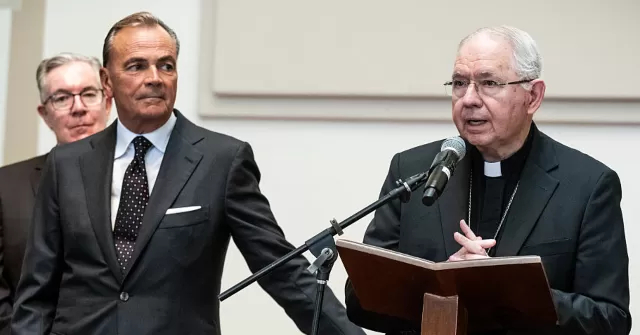The U.S. Catholic Bishops have recently come under fire for their harsh criticism of President Donald Trump’s immigration policies. In a recent statement, the bishops compared the actions of Immigration and Customs Enforcement (ICE) to those of Nazis and slave catchers, causing a stir among the Catholic community and beyond.
The bishops’ statement, released on the official website of the United States Conference of Catholic Bishops, condemns the recent increase in deportations carried out by ICE. The bishops claim that these deportations are causing “fear and panic” among immigrant communities and are tearing families apart. They go on to compare the actions of ICE to those of Nazis and slave catchers, stating that “the use of tactics reminiscent of those used by oppressive regimes throughout history is deeply concerning and unacceptable.”
This strong language has sparked controversy and backlash from many who see the comparison as extreme and inappropriate. Some have accused the bishops of politicizing the issue and using inflammatory rhetoric to push their own agenda. However, the bishops stand by their statement and argue that it is their duty as leaders of the Catholic Church to speak out against injustice and defend the vulnerable.
But what exactly are the bishops referring to when they compare ICE to Nazis and slave catchers? Let’s take a closer look at the history of these two groups and their tactics.
The Nazis, or National Socialist German Workers’ Party, were a political party that rose to power in Germany in the 1930s. Under the leadership of Adolf Hitler, they implemented a regime of terror and oppression, targeting Jews, homosexuals, people with disabilities, and other minority groups. The Nazis used tactics such as mass deportations, forced labor, and concentration camps to carry out their agenda of ethnic cleansing.
Similarly, slave catchers were individuals hired to capture and return escaped slaves to their owners in the United States during the 18th and 19th centuries. They were known for their brutal methods, often using violence and intimidation to track down and capture slaves. The practice of slave catching was a key component of the slave trade and contributed to the systemic oppression and exploitation of African Americans.
So why are the bishops drawing parallels between these two groups and ICE? The answer lies in the methods used by ICE to carry out deportations. In recent years, ICE has faced criticism for its aggressive tactics, including raids on homes and workplaces, detention of children and families, and the use of force during arrests. These tactics have been met with widespread condemnation and have raised concerns about human rights violations.
The bishops argue that these tactics are reminiscent of those used by the Nazis and slave catchers, as they target and terrorize vulnerable populations. They also point out that the current immigration policies, which prioritize deportation over finding a path to citizenship, are in direct opposition to Catholic teachings on the dignity of every human person.
It is important to note that the bishops are not condemning all immigration policies or calling for open borders. They acknowledge the need for secure borders and a fair and just immigration system. However, they believe that the current approach is not in line with Catholic values and is causing harm to individuals and families.
In response to the backlash, the bishops have stood firm in their stance and have called for a more compassionate and humane approach to immigration. They have also urged Catholics to pray for and support immigrant communities, and to advocate for policies that uphold the dignity and rights of all individuals.
In conclusion, the comparison made by the U.S. Catholic Bishops between ICE and Nazis and slave catchers may be controversial, but it serves as a powerful reminder of the importance of upholding human dignity and standing up against injustice. As Catholics, we are called to love and serve our neighbors, regardless of their immigration status. Let us heed the words of the bishops and work towards a more just and compassionate immigration system for all.






![Complete BritRail Pass Guide [Types, How to Use It, Pros + Cons]](https://inside-news.uk/wp-content/uploads/2025/06/00221EB4-BCA2-4DBB-6CD4-83DBC37D71FA-120x86.webp)















